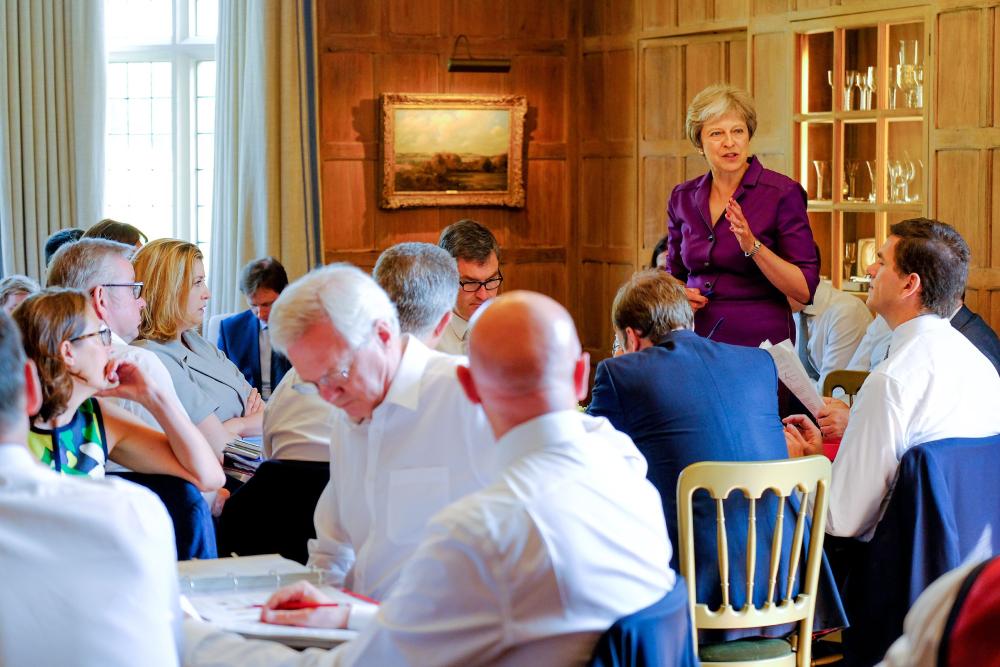
The government has reached a "collective agreement" on a new post-Brexit plan which will allow the UK to freely trade agricultural goods with the EU based on a "common rule book".
Under plans for the free trade zone, the UK would be committed legally to following EU law for a large part of the economy, including agriculture.
At the highly-anticipated Chequers meeting on Friday (6 July), the Prime Minister has opted for a closer relationship with the EU after fears the farming industry would see the government pursuing a 'hard Brexit' scenario.
The "facilitated customs arrangement" compromise plan will closely mirror EU rules, and allow the UK to set its own tariffs on goods arriving in the country.
Prime Minister Theresa May has described the plan as one which "offers the best of both worlds".
The proposal was approved at the meeting, where Ministers spent the day mapping out the government's preferred option for the UK's post-Brexit future.
May said the cabinet had “agreed our collective position for the future of our negotiations with the EU”. That included a proposal to “create a UK-EU free trade area which establishes a common rule book for industrial goods and agricultural products” after Brexit.
The FCA is the latest plan by Downing Street to resolve one of the biggest conundrums facing the government, how Britain will be able to strike free trade deals without the need for EU border checks.
The EU's customs union helps reduce administrative and financial trade barriers and enhance economic cooperation.
However, they also limit the freedom of their individual members to strike their own trade deals.
'Important breakthrough'
The Country Land and Business Association (CLA) has said Friday's agreement is an "important breakthrough" in delivering a "clear vision" for a post-Brexit UK.
“Farmers and other rural businesses rely heavily on frictionless trade and movement of goods across EU borders and I welcome the agreement that has been reached which delivers on many of the arguments made not just by the CLA but by a wide range of business leaders,” CLA President, Tim Breitmeyer said.
“A future relationship which imposes barriers to trade or excludes agri-food would not just put at risk farming businesses but have a devastating impact across the wider rural economy.
“The Government’s vision still has to be negotiated and agreed with the EU and we must not be complacent that any deal is done but it provides a strong starting point and much needed certainty to farmers and rural businesses on what the future may hold.
Mr Breitmeyer added: “I will be encouraging my farming colleagues across Europe, for who this is a significant step forward as well, to urge their governments to agree to the Prime Minister’s proposal.”
'Incontrovertible'
The Farmers' Union of Wales (FUW) has said the evidence supporting the need for the UK to remain in the customs union and the single market after Brexit is "incontrovertible", and that common sense "must prevail."
“Continuing membership of these two institutions is the only way to avoid the dire collapse in incomes predicted in the latest AHDB report and in the FAPRI report in August,” said FUW President Glyn Roberts.
The FUW has in the past demanded Welsh access to the customs union, calling it "critical" for rural Wales.
Stephen James, former NFU Cymru President, said that the only ‘sensible option’ for Brexit negotiators was for the UK to remain a part of the customs union, at least until a time where a comprehensive free trade agreement can be reached.
He said: “In my mind the only sensible option is for us to remain in the Customs Union until such time as a comprehensive free trade agreement is agreed between the EU and the UK.”
NFU President, Minette Batters has said frictionless trade with the EU is crucial to underpin market stability – vital not just for farmers but the many wider supply chain businesses that depend on a thriving sheep sector.
In 2015, the value of sheep meat exports to the EU topped £302 million – representing 95% of all such exports.
For the Scottish sheep sector, a report by the AHDB has revealed it could be destroyed by a 'hard' Brexit, with average incomes expected to decline by 210 per cent.
The warnings from the industry follows news of over 100 food and farming organisations calling on the government to maintain free and frictionless trade with the EU.
